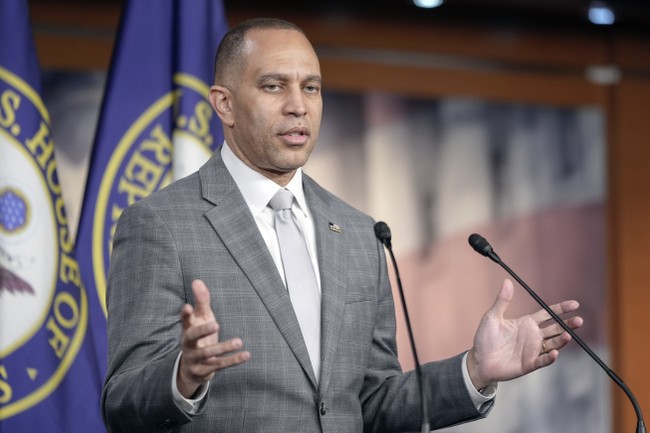ARTICLE AD BOX
BRUSSELS — Just as Europe’s far right is poised to make big gains in next month’s EU election, a spat between the two of its most powerful parties risks spoiling the victory parade before the champagne is even opened.
This week a long-simmering feud between Alternative for Germany (AfD)and Marine Le Pen’s National Rally in France exploded. Le Pen’s party is polling first in France, ahead of President Emmanuel Macron, while the AfD is polling second in Germany. Together they could return about 50 MEPs to the next Parliament, and team up as a nationalist, anti-immigration political force.
But, for now at least, Le Pen wants to keep the Germans at arm’s length. Her lead candidate Jordan Bardella’s campaign director said comments about the Nazis by AfD lead candidate Maximilian Krah went too far by asserting that SS members were not necessarily war criminals.
The National Rally is now insisting it can no longer sit with the AfD in their Identity & Democracy faction in the European Parliament. If the Nazi comments weren’t enough, last month German authorities charged one of Krah’s parliamentary assistants with spying for Beijing, and an AfD candidate has been embroiled in a cash-for-influence scandal involving a pro-Russian propaganda outlet. While National Rally is surging in polls, AfD is losing steam.
The French have also been irked by a far-right conference involving AfD officials talking about “remigrating” millions of people from Germany, and taunts by AfD MPs over the legal status of the French overseas department of Mayotte in the Indian Ocean.
The inability of National Rally and AfD to work in a group could be significant. EU lawmakers are elected at national level but then form international alliances to wield more influence in the European Parliament, which shapes EU laws and spending. Other parts of the ID group, such as Matteo Salvini’s League, and the Danish People’s Party’s Anders Vistisen also stuck the boot in, calling for the AfD’s exclusion.
Even if the AfD is not formally kicked out of ID, it could simply be omitted when the group is reconstituted after the election, one ID staffer suggested.
The following are the big questions as the EU enters the red-hot campaign period ahead of the June 6-9 poll.
What does this mean for Europe’s far right?
In some ways the tensions are nothing new: Europe’s far right is already divided on the EU stage, split between three separate camps in the European Parliament: a hard-right camp of Euroskeptics and nationalists that includes Giorgia Meloni’s Brothers of Italy and Poland’s Law & Justice, the far-right ID group, and then Hungarian Prime Minister Viktor Orbán’s battalion of MEPs, who are unattached and left out in the cold.
Since 2019, the French and Germans in the ID group have been led by the League party of Matteo Salvini. ID is expecting its ranks to swell in the next Parliament thanks to an influx of MEPs from Geert Wilders’ Freedom Party in the Netherlands, Vlaams Belang in Flanders and the surging Chega in Portugal — but the French and Germans (if they’re readmitted) will still be by far the largest blocs inside it.
The German far right and the French far right are not historical bedfellows in the European Parliament, anyway. The AfD has only sat with the French National Rally since 2019, and only joined its pan-European umbrella party last year.
More broadly, the far right is also divided on policy, which blunts its effectiveness: Russia’s war in Ukraine is a divisive topic, as is how to treat China.
 Marine Le Pen’s been on a crusade to repackage her party as respectable, non-threatening and ready to rule France. | Oscar Del Pozo/AFP via Getty Images
Marine Le Pen’s been on a crusade to repackage her party as respectable, non-threatening and ready to rule France. | Oscar Del Pozo/AFP via Getty ImagesThe center-right — including, it seems the current Commission President Ursula von der Leyen — believes that some parts of the ECR group — chiefly Meloni’s MEPs — can be tempted away from the more extreme elements of their grouping to work together with the pro-European forces.
Why is Le Pen doing this?
There’s an election on.
Plus, the AfD and the National Rally have been on different trajectories for years now. While the AfD has been radicalizing with pro-Russian rhetoric, and even alienating some of its current crop of MEPs who are deeply unhappy about the party’s direction, Le Pen’s been on a crusade to repackage her party as respectable, non-threatening and ready to rule France. It’s little wonder: she will likely challenge, again, for the French presidency in 2027.
Though it would surely weaken the ID group numerically in the European Parliament, cutting ties with the far-right Germans in Brussels plays well at home, and removes a stick Macron — or his lead candidate Valérie Hayer — can use to batter her with.
What could this mean for the next Parliament?
The next Parliament, if polls are to be believed, is expected to shift rightward.
The lines between ECR and ID are already blurred, though, making it confusing even for the most seasoned Parliament watchers to understand why some parties belong to the different camps. For example, only recently the far-right Reconquest party of far-right firebrand Éric Zemmour (led by Marine Le Pen’s niece Marion Marechal) announced that one of its MEPs was joining the ECR.
Viktor Orbán is stalking the ECR group too, having expressed enthusiasm to join.
So while Le Pen can win domestic political points by saying she will not align with AfD, she can still be confident that the rough groupings of the right can help vote in favor of her political interests in Brussels.
What could it mean for AfD if they end up groupless?
Being without a political group (there are currently seven) means you don’t get access to millions of euros of funding that comes from the EU budget, nor do you get the same allocation of speaking time in the Parliament’s plenary, nor the prestige of belonging to one of the institution’s political families.
The prospect of one of the parties in ID being ousted into the so-called non-attached part of the Parliament won’t change much though, since an informal cordon sanitaire already blocks the AfD and any ID parties from holding the pen on legislative work, or chairing committee. Their amendments to legislation are automatically ignored by the rest of the MEPs in Parliament, too.
Could this lead to a much bigger far-right tie-up?
The ECR and ID groups already tried to merge a few years ago — but failed.
Even though a German exit might look on paper like it’s merely generating more fragmentation and chaos on the Parliament’s far-right flank, some believe it could pave the way for a deepening of cooperation, and even a merger between the ID and ECR groups.
“A more fundamental change has now also become possible, with Le Pen using this to argue for a merger with Meloni, Orbán, Wilders & Co. towards a united far-right sans the most radical part,” wrote Nicolai von Ondarza, a political scientist at SWP Europe, on X (formerly Twitter).
However, the prospect of a single group on the far right — which genuinely could have consequences for Europe’s policy agenda — and be the Parliament’s second largest force, crops up frequently before EU elections, and has been ruled out by Giorgia Meloni’s MEPs.
.png)
 9 months ago
3
9 months ago
3








 English (US)
English (US)